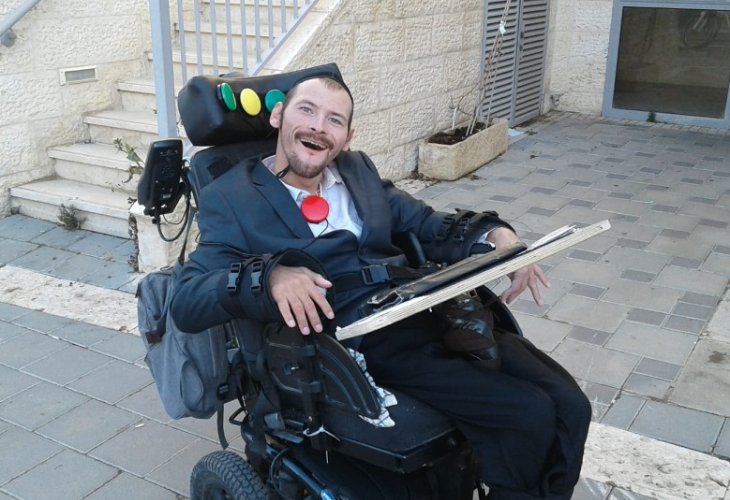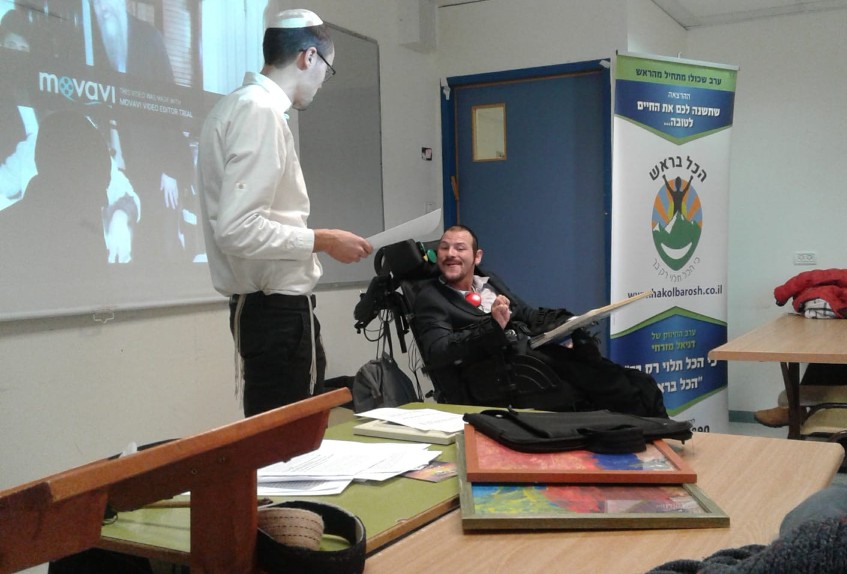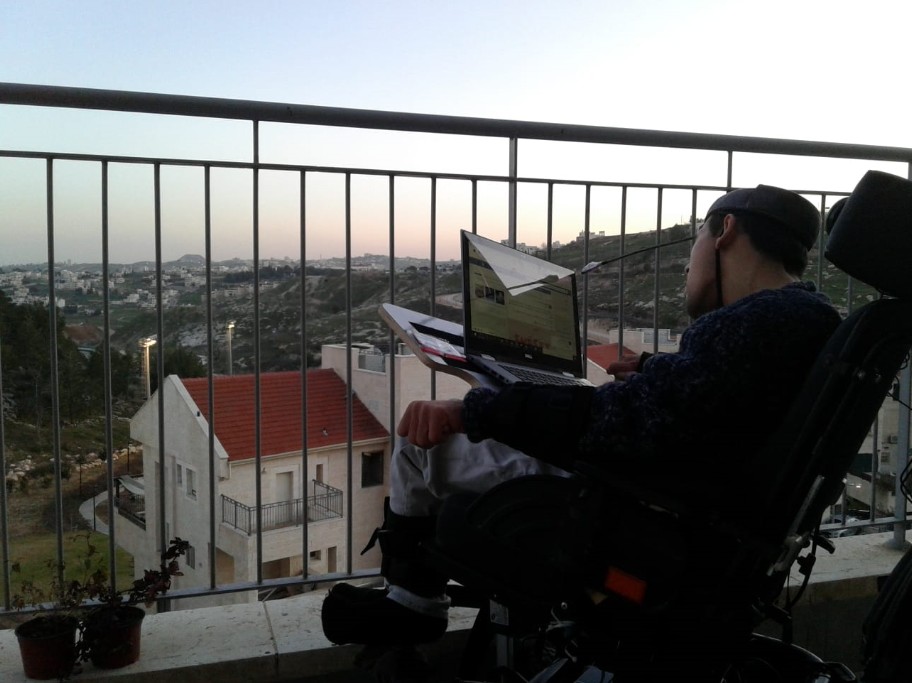The Transformation of Daniel Mizrahi: From Foster Homes to Independent Living and a Private Business
Daniel Mizrahi shares his significant life changes over the past year: moving to his own apartment, starting his own business, and, most importantly, gaining independence through divine providence. "I approached a nursing company, and the representative asked me: 'Are you Daniel Mizrahi who writes for the Hidabroot website?'"
 Daniel Mizrahi
Daniel MizrahiIf you see Daniel Mizrahi on the street, you might think many things about him. But quite certainly, you wouldn't guess that this talented young man, confined to a wheelchair and able to communicate only through his head (using a tablet or mobile phone), is also a fresh lecturer and private business owner.
Yes, you heard correctly. Daniel Mizrahi has always pushed boundaries. About two years ago, I interviewed him for my program on the Hidabroot Channel, "Journey Between Souls," and after some time, I return to him again, to discover that even his boldness and aspirations diminish over time as he continues to fulfill dreams.
You Have Wings of Spirit
"Two years ago, I moved from the hostel in Migdal HaEmek to a place called 'Kanfei Ruach,' and in the initial period after the transition, welfare sought an occupational setting for me. They sent me to several places that didn't cognitively fit me. When I told them the places weren't suitable, they said, 'Try for a month.' I tried. After two weeks, I had enough, and I said, that's it, I'm not willing to waste my life on something that won't advance me in life, just because of the outer appearance.
"The hostel manager asked, 'Are you aware you'll be alone for a few hours in the morning?' I told him I didn't care. That's how it was for about a year. Every morning, I insisted to the welfare people to give me something that suits me. Meanwhile, since I was alone in the mornings, I wandered the streets and slowly learned to manage alone and use public transportation, thus acquiring independence within my limitations."
When did the change come?
"After a year, welfare approved personal funding through the Joint Israel organization. This organization provides each person who doesn't fit an occupational framework what they deserve personally to realize their abilities. I always aspired to establish a business or organization, through which I could spread my mission in the world, the message that everything is in the mind. If you want, you achieve anything. This organization funded the boost for my business, called 'Everything is in the Mind,' through a business consultant, and today I give lectures on personal empowerment through my life story. Besides the lectures, I have one-on-one talks in special education schools and also with regular people, planning to expand it into a whole venture with Hashem's help..."
During the uplifting lectures, Daniel, fully paralyzed except for his head, unravels his touching and incredible life story. How from an abandoned baby in a hospital, he became a strong and happy man achieving all his goals, and how he learned not to let disability stop him, because in his words, "everything is in the mind."
With humor and rare openness, Daniel relates his various life challenges and shares the tools he acquired in his journey to full independence. The lecture incorporates video clips documenting Daniel's daily life and original songs he wrote and performed over the years. At the end of the lecture, the audience is invited to ask anything and, of course, to share their experiences.
The lecture's name, "Everything is in the Mind," was chosen because Daniel has a rare form of cerebral palsy, and all his actions are performed by the mind alone, both physically and internally. The message Daniel sets forth is that everyone can choose who they are and how their life will look, and that inner freedom and resilience are the recipe for success and true happiness.

"I Felt I Was Ready for Independent Life"
But Daniel's story doesn't end with establishing the business.
"A year ago, I decided to make a drastic change in my life. For twenty-seven years, I grew up in a foster family that provided me support, warmth, and love. I've already told my life story in the past, so I won't go into detail. At age 24, welfare took me out of the family to hostels. In the first place, I felt really bad, and managed to move to Jerusalem, to a place where they give you freedom, and allow you to choose what you want to do.
"It was like an apartment with four roommates with different disabilities. The place was excellent, but after a year, it was closed and I moved to 'Kanfei Ruach.' Initially, this place was the best for me in learning independent handling, like using public transportation, managing finances independently, and so on."
If it was good initially, what happened later?
"A year ago, I felt I was ready for independent life and discovered I was entitled to an apartment from the Ministry of Housing. I decided to apply to the Ministry of Housing for my own apartment. This process was bureaucratic and long, like everything in our country, but I didn't give up. I fought hard, and after six months, I got approval for my own apartment. But the story didn't end there. According to Ministry of Housing rules, everyone entitled gets a two-room apartment with a kitchen. You're given three apartments to choose from. When I saw the first apartment offered to me, I was shocked. A 115 square meter apartment with three rooms, a kitchen, and a living room, in a religious neighborhood. See how Hashem loves me and gives me everything.
"The process after signing the contract was also mentally challenging because suddenly I saw myself in a completely different life. All the time I thought 'what will be' and 'how will it be', because until now I was used to having someone behind me, like the institutions or the foster family who were always behind me. And now I have to take full care of myself. But I told myself, why am I so worried? I have a Father in heaven who takes care of every detail in my life. I deeply engraved this sentence in my mind, and thus I proceeded onward.
"A month and a half before the move, I needed full furniture for the house. Initially, I tried to raise the money for furniture through friends and relatives, but I saw it didn't work. I told my Heavenly Father to send me a messenger who would help me with all the matters of furnishing the house."
And did He send one?
"Exactly. The next morning, I received, through divine providence, the number of Kalman Liebskind, a famous journalist, and I reached out to him for help. He first asked to meet with me. We met on Sunday morning. The next day, we started a campaign of 50,000 shekels, and within six days, with Hashem's grace, I reached the target and furnished the entire house.
"After the stage of furnishing, I moved on to the issue of the foreign worker who would care for me regularly. I had numerous concerns. Who would he be? How would he get along with me? I approached a nursing company, and through divine providence, the representative asked me: 'Are you Daniel Mizrahi who writes for the Hidabroot website?'...
"She told me: 'I'll make sure you get the best caregiver possible.' And indeed, thank Hashem, a golden caregiver arrived, and quickly Hashem granted us a common language. I can hardly describe how easily he understands me, it's a piece of a miracle.
"Two and a half weeks ago, I moved into the apartment. I had a very special housewarming, for the first time in my life, I blessed the placement of a mezuzah. I was completely overcome with tears from the excitement, that the Creator of the World gives me the strength and the tools to reach every goal in life, even if the goal seems utterly absurd. They tell me 'You won't succeed, you're in a mute body. You barely speak, and what are you capable of doing?' But I see no one in my eyes, I only see the Creator of the World walking with me everywhere and holding me every moment in my life!".

Today, after the change, what is your daily routine?
"Every day I wake up, get ready, and pray. There are days when I need to go for errands, like to the bank and such, to do grocery shopping for living, etc. Besides that, I manage chats with groups of people with different disabilities, and together we help each other. Recently, many have been contacting me from abroad as well. That's my main occupation every day. In the evenings and on Shabbat, I have classes on Chassidut, Halacha, and also a study partner in studying Gemara."
What are your aspirations for the new business, beyond the lectures?
"My aspirations are to turn 'Everything is in the Mind' into something nationwide. This is reflected in the expansion of my method, in weekly group meetings and one-on-one meetings, as well as writing a blog and columns, and of course more activities."
How does society accept you today? How do people behave when they see you for the first time?
"About a month ago, I went with the entire group to a lecture. On the way to the hall, I sneaked away from the group, as I usually do, and moved ahead on my own before the instructors. The need to escape from everyone is so that I don't feel like I'm a subject of the instructors. This is my way of asserting my independence at all costs and in various situations in daily life. It's my way of minimizing the sense of dependence on the surroundings.
"At the entrance to the hall, a guy approached me and started with the usual inquiries I've learned to recognize from people who often approach me in the street: Are you okay? Why are your legs and arms tied? How does the wheelchair move by itself? What are the colorful buttons on the chair behind your head?
"Over the years, I've formulated structured answers to these banal questions: Yes, I'm fine, just like you, even though I might look to you as if I'm an inmate in this wheelchair; my hands and legs are tied because I have no motor control over them and I might unintentionally throw you a 'slap'...; and regarding the wheelchair and the colorful buttons, my head is the only functioning part of my body and it compensates for all other parts. So, using head movements and pressing the buttons behind, I operate my wheelchair.
"Well, these are the usual answers I usually give to those who ask. But this time I didn't do that.
My speech is very slow, and because the line to the hall was crowded, I was under pressure and chose to ignore. Minutes later, I remembered that guy's questions and my disregard of him. It was difficult for me, realizing I was impatient with others. This is a very sensitive point for me, and I usually experience it personally in the opposite direction.
"I recalled an example that happened to me a week before, when as part of the change I'm making in my life - moving to independent life and living in my own private home - I chose to go to National Insurance on my own, without any escort. I felt I could handle this challenge, but simultaneously I was full of apprehensions. Unfortunately, I encountered a clerk lacking basic tact. She didn't want to look at me while I talked to her, she didn't even try to listen, but immediately called a security guard and asked him to translate my words as if I were a Chinese tourist who didn't speak Hebrew. Understandably, the guard succeeded precisely in understanding me. This experience boiled me inside. I felt that no matter how much I progress and develop, society is impatient and unwilling to accept me.
"Now suddenly I felt that the things I expect to receive from the surroundings, I myself don't always comply with.
This understanding overwhelmed me with a sense of guilt, and I resolved to try to show patience and care as much as possible.
"After the lecture I was happy to see that guy making his way toward me. He approached me again, and of course, I treated him completely differently. We talked for a long while and I answered all his questions. I saw he identified with me greatly, and felt there's a story behind it. My feelings turned out to be accurate. A few minutes later, he shared with me that he has a brother suffering from CP paralysis, and he too moves around in a wheelchair. Our meeting ignited within me the point that has always burned inside me. We must treat others with patience and not rush to judge them, because behind every person lies a whole life story."

